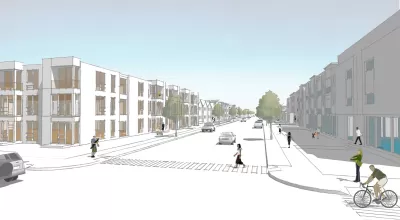A recent study surveyed 800 jurisdictions in 50 U.S. metropolitan areas to quantify the amount of change in zoning regulations throughout the 21st century so far.

Research published in June by the Journal of the American Planning Association examined zoning changes in major U.S. metropolitan areas from 2003 to 2019, finding that zoning grew more accommodating to apartments in strong-market metro areas over that time period.
In addition to the abstract, which is available online, the researchers—Rolf Pendall, Lydia Lo, and Jake Wehmann—provide this "takeaway for practice":
Local land use planners in the United States have ethical and legal obligations to undo the racial segregation designed into zoning from its founding. They also must prepare for continued population growth. Tools and strategies exist to do both of these, and some planners have the commitment and political space to use them. In other places, planners and their professional organizations need to change rules within their own communities and advocate for state legislative reforms so that planning works predictably to unwind unequal and exclusionary settlement patterns within neighborhoods and cities.
The study's abstract suggests that the findings function as a counter-narrative to opinions of pundits and economists that zoning explains housing price inflation in fast-growth metro areas. This research shows the limitation fo the narrative, according to the authors.
For more of the ongoing debate about zoning's role in the housing market, and attempts by local jurisdiction to create more affordable housing supply by loosening zoning restrictions on multi-family housing, see the collection of articles flied under Planetizen's Zoning Reform tag.
The article's abstract and a link to the (paywalled) study is available below. To access some of the research without a paywall, see also a follow up brief built on the original study, recently published by the Urban Institute and written by Patrick Spauster, Lydia Lo, and Yonah Freemark.
FULL STORY: Shifts Toward the Extremes

Maui's Vacation Rental Debate Turns Ugly
Verbal attacks, misinformation campaigns and fistfights plague a high-stakes debate to convert thousands of vacation rentals into long-term housing.

Planetizen Federal Action Tracker
A weekly monitor of how Trump’s orders and actions are impacting planners and planning in America.

Chicago’s Ghost Rails
Just beneath the surface of the modern city lie the remnants of its expansive early 20th-century streetcar system.

Bend, Oregon Zoning Reforms Prioritize Small-Scale Housing
The city altered its zoning code to allow multi-family housing and eliminated parking mandates citywide.

Amtrak Cutting Jobs, Funding to High-Speed Rail
The agency plans to cut 10 percent of its workforce and has confirmed it will not fund new high-speed rail projects.

LA Denies Basic Services to Unhoused Residents
The city has repeatedly failed to respond to requests for trash pickup at encampment sites, and eliminated a program that provided mobile showers and toilets.
Urban Design for Planners 1: Software Tools
This six-course series explores essential urban design concepts using open source software and equips planners with the tools they need to participate fully in the urban design process.
Planning for Universal Design
Learn the tools for implementing Universal Design in planning regulations.
planning NEXT
Appalachian Highlands Housing Partners
Mpact (founded as Rail~Volution)
City of Camden Redevelopment Agency
City of Astoria
City of Portland
City of Laramie





























